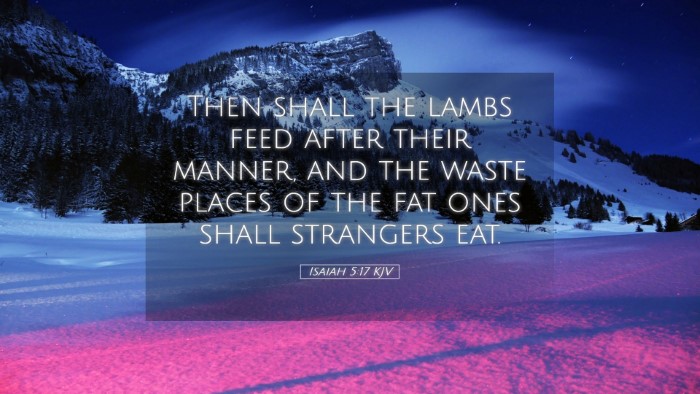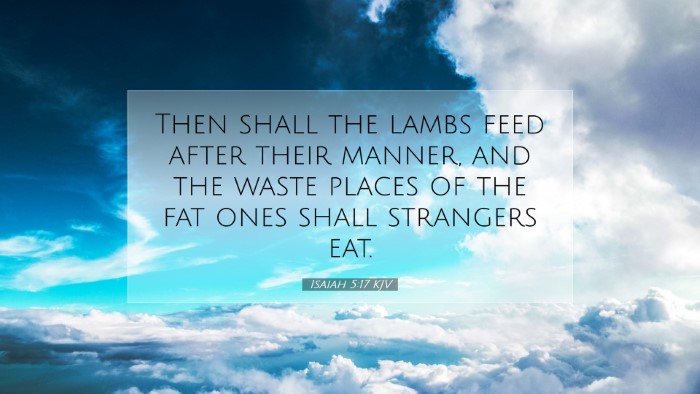Isaiah 5:17 Commentary
Verse: "Then shall the lambs feed after their manner, and the waste places of the fat ones shall strangers eat."
Introduction
The verse from Isaiah 5:17 reflects the profound themes of judgment and restoration found throughout the book of Isaiah. This commentary synthesizes the insights of notable theologians and scholars, offering a rich exploration of the meanings and implications of this verse for modern readers, pastors, and theologians.
Contextual Overview
In the broader context of Isaiah 5, the prophet addresses the consequences of Israel's moral and spiritual decay. The chapter opens with the allegory of a vineyard, representing God's people, which has produced wild grapes instead of good fruit. This metaphor highlights the failures of Israel, leading to divine judgment.
Verse Analysis
Imagery of the Lambs
Matthew Henry emphasizes the pastoral imagery in this verse, noting that "the lambs feeding as they ought" signifies innocence and restoration. The return of lambs to proper feeding denotes a time when God’s people will be cared for again, free from the oppression that had plagued them.
Waste Places and Strangers
Albert Barnes draws attention to the "waste places of the fat ones," indicating that those who had previously been in power and affluence would see their abundance turned into desolation. The strangers feeding from these waste places may denote both the judgment of God upon the unfaithful and the transfer of blessings that were once reserved for Israel to outsiders.
Theological Implications
Adam Clarke gives an insightful view of the divine providence present in this verse. He suggests that God will allow those who once oppressed His people to now nourish and benefit from the very places that reflect their previous excess. This serves as a reminder of the transient nature of worldly power and wealth.
Thematic Insights
- Restoration: The imagery of lambs signifies hope and renewal. It points to the future restoration of Israel — a recurring theme throughout Isaiah's prophecy.
- Judgment: The verse embodies the justice of God as oppressors are displaced, and their resources are redistributed, underscoring the themes of divine retribution.
- Divine Care: The nurturing of lambs after their manner emphasizes God's attentive care for His people, suggesting a return to a pastoral state of being where He cares for the needs of the meek and humble.
Application for Today
For pastors and theologians, Isaiah 5:17 serves as a reminder of the cyclical nature of sin, judgment, and grace. As believers navigate modern cultural and spiritual challenges, this verse encourages hope in God's restorative actions. Even amidst judgment, the promise of nourishment and care from God remains—a source of comfort for those who feel marginalized or oppressed.
Students of the Bible can glean valuable lessons about the nature of God’s justice and mercy. The verse illustrates how God can turn the consequences of sin into opportunities for growth and regeneration. This principle can inform our understanding of personal and communal sin, emphasizing repentance and the hope of renewal in Christ.
Conclusion
Isaiah 5:17 encapsulates the essence of God’s dealings with humanity. It calls readers to reflect on the seriousness of sin, the reality of judgment, and the ever-present hope for restoration. By studying the insights of biblical commentators, we deepen our understanding of this profound verse, fostering a richer appreciation for God’s character and His redemptive plans for His people.


